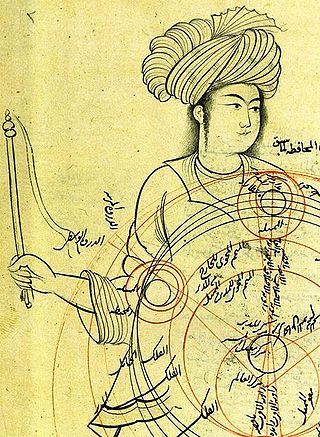
Deutsches Institut für Normung e.V. is a German non-profit organization and acting as national organization for standardization. DIN is the German ISO member body. DIN is headquartered in Berlin. There are around thirty thousand DIN Standards, covering nearly every field of technology.

Jalāl al-Dīn Muḥammad Rūmī, or simply Rumi, was a 13th-century poet, Hanafi faqih (jurist), Islamic scholar, Maturidi theologian (mutakallim), and Sufi mystic originally from Greater Khorasan in Greater Iran.

Salah ad-Din Yusuf ibn Ayyub, commonly known as Saladin, was the founder of the Ayyubid dynasty. Hailing from a Kurdish family, he was the first sultan of both Egypt and Syria. An important figure of the Third Crusade, he spearheaded the Muslim military effort against the Crusader states in the Levant. At the height of his power, the Ayyubid realm spanned Egypt, Syria, Upper Mesopotamia, the Hejaz, Yemen, and Nubia.

The Zengid or Zangid dynasty, Atabegs of Mosul was an Atabegate of the Seljuk Empire created in 1127. It formed a Turkoman dynasty of Sunni Muslim faith, which ruled parts of the Levant and Upper Mesopotamia, and eventually seized control of Egypt in 1169. In 1174 the Zengid state extended from Tripoli to Hamadan and from Yemen to Sivas. Imad ad-Din Zengi was the first ruler of the dynasty.

Nūr al-Dīn Maḥmūd Zengī, commonly known as Nur ad-Din, was a Turkoman member of the Zengid dynasty, who ruled the Syrian province of the Seljuk Empire. He reigned from 1146 to 1174. He is regarded as an important figure of the Second Crusade.

Abu'l Hasan Yamīn ud-Dīn Khusrau, better known as Amīr Khusrau, was an Indo-Persian Sufi singer, musician, poet and scholar who lived during the period of the Delhi Sultanate.

Mu'in al-Din Hasan Chishti Sijzi, known reverentially as Khawaja Gharib Nawaz, was a Persian Islamic scholar and mystic from Sistan, who eventually ended up settling in the Indian subcontinent in the early 13th-century, where he promulgated the Chishtiyya order of Sunni mysticism. This particular Tariqa (order) became the dominant Islamic spiritual order in medieval India. Most of the Indian Sunni saints are Chishti in their affiliation, including Nizamuddin Awliya and Amir Khusrow.

"Dragostea Din Tei" is a song by Romania pop group O-Zone, released as the second single from their third studio album, DiscO-Zone (2004). The song's title is Romanian for "Love from the linden tree". The song quickly reached number one on the Eurochart Hot 100 Singles, where it remained for 12 weeks between June and early September 2004. It topped the single charts in France, Germany, and Austria for over three months, reached number 3 in the United Kingdom and number 72 on the US Pop 100. The song became the fourth best-selling single of the 21st century in France, with 1.17 million units sold.
A beth din is a rabbinical court of Judaism. In ancient times, it was the building block of the legal system. Today, it is invested with legal powers in a number of religious matters both in Israel and in Jewish communities in the diaspora, where its judgments hold varying degrees of authority in matters specifically related to Jewish religious life.

The Safavid order, also called the Safaviyya, was a Sufi order (Tariqa) founded by the Kurdish mystic Safi-ad-Din Ardabili. It held a prominent place in the society and politics of North Western Iran in the fourteenth and fifteenth centuries, but today it is best known for having given rise to the Safavid dynasty.

Naser al-Din Shah Qajar was the fourth Shah of Qajar Iran from 5 September 1848 to 1 May 1896 when he was assassinated. He was the son of Mohammad Shah Qajar and Malek Jahan Khanom and the third longest reigning monarch in Iranian history after Shapur II of the Sassanid dynasty and Tahmasp I of the Safavid dynasty. Nasser al-Din Shah had sovereign power for close to 51 years.

The Mamluk dynasty, also known as Slave dynasty, was a dynasty which ruled the Delhi Sultanate from 1206 to 1290. It was the first of five largely unrelated dynasties to rule the Delhi Sultanate until 1526. Before the establishment of the Mamluk dynasty, Qutb al-Din Aibak's tenure as a Ghurid dynasty administrator lasted from 1192 to 1206, a period during which he led forays into the Gangetic plain and established control over some of the new areas.

Qotb al-Din Mahmoud b. Zia al-Din Mas'ud b. Mosleh Shirazi was a 13th-century Persian polymath and poet who made contributions to astronomy, mathematics, medicine, physics, music theory, philosophy and Sufism.
The Ghurid dynasty was a Persianate dynasty of presumably eastern Iranian Tajik origin, which ruled from the 8th-century in the region of Ghor, and became an Empire from 1175 to 1215. The Ghurids were centered in the hills of the Ghor region in the present-day central Afghanistan, where they initially started out as local chiefs. They gradually converted to Sunni Islam after the conquest of Ghor by the Ghaznavid ruler Mahmud of Ghazni in 1011. The Ghurids eventually overran the Ghaznavids when Muhammad of Ghor seized Lahore and expelled the Ghaznavids from their last stronghold.

The Seljuk dynasty, or Seljukids, Seljuqs, also known as Seljuk Turks, Seljuk Turkomans or the Saljuqids, was an Oghuz Turkic, Sunni Muslim dynasty that gradually became Persianate and contributed to Turco-Persian culture in West Asia and Central Asia. The Seljuks established the Seljuk Empire (1037–1194), the Sultanate of Kermân (1041–1186) and the Sultanate of Rum (1074–1308), which stretched from Iran to Anatolia and were the prime targets of the First Crusade.

Din Tai Fung is a Taiwanese restaurant chain specializing in Chinese cuisine, particularly famous for its Xiaolongbao. Based in Taipei, Taiwan, Din Tai Fung also has branches in Australia, Mainland China, Hong Kong, Indonesia, Japan, Macau, Malaysia, the Philippines, Singapore, South Korea, Thailand, United Arab Emirates, United Kingdom, and the United States.

Muhammad ibn Muhammad ibn al-Hasan al-Tusi, also known as Nasir al-Din al-Tusi or simply as (al-)Tusi, was a Persian polymath, architect, philosopher, physician, scientist, and theologian. Nasir al-Din al-Tusi was a well published author, writing on subjects of math, engineering, prose, and mysticism. Additionally, al-Tusi made several scientific advancements. In astronomy, al-Tusi created very accurate tables of planetary motion, an updated planetary model, and critiques of Ptolemaic astronomy. He also made strides in logic, mathematics but especially trigonometry, biology, and chemistry. Nasir al-Din al-Tusi left behind a great legacy as well. Tusi is widely regarded as one of the greatest scientists of medieval Islam, since he is often considered the creator of trigonometry as a mathematical discipline in its own right. The Muslim scholar Ibn Khaldun (1332–1406) considered Tusi to be the greatest of the later Persian scholars. There is also reason to believe that he may have influenced Copernican heliocentrism.

Wish Dragon is a 2021 animated fantasy comedy film written and directed by Chris Appelhans and produced by Sony Pictures Animation and Tencent Pictures. The film stars Jimmy Wong, John Cho, Constance Wu, Natasha Liu Bordizzo, Jimmy O. Yang, Aaron Yoo, Will Yun Lee, and Ronny Chieng. Jackie Chan produced the film and voiced Cho's role in the Chinese Mandarin version.

DIN 7876 is a German standard specifying how swimming fins should be dimensioned, tested and marked for conformity. In 1980, the Deutsches Institut für Normung (DIN) published consecutively numbered German standards DIN 7876, DIN 7877 and DIN 7878 dedicated respectively to the swimming fin, the diving mask and the breathing tube, which constitute basic underwater diving equipment. DIN 7876 of October 1980 is entitled Tauch-Zubehör – Schwimmflossen – Maße, Anforderungen und Prüfung in German and subtitled “Diving accessories for skin divers; Flippers, dimensions, requirements and testing” in English. This standard establishes certain quantitative and qualitative specifications for swimming fins, with particular reference to foot pockets and heel straps. Swimming fin manufacturers fulfilling such requirements may mark their products as compliant with this standard. The status of DIN 7876 is currently zurückgezogen, meaning: “withdrawn”.
Jamal al-Din al-Ghaznawi, was a Sunni Hanafi jurist, theologian, and Kalam scholar of the Maturidi school.
















